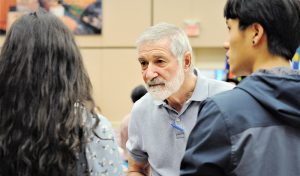Some friendships are so iconic that they can only be understood in pairs. Frodo and Sam. Cher and Dionne. Maverick and Goose. They reinforce for us the value of friendship, of having a ride-or-die, to share life’s rollercoaster highs and lows (even if those lows take you to the gates of Mordor).
To be sure, scientific research shows that friends can improve our mental and physical well-being. Researchers at the University of Virginia conducted an experiment in which students were asked to climb a steep hill, each with a backpack filled with weights. (Note: They didn’t actually climb the hill.) When asked to guess how steep they thought the incline was with backpack in tow, those who were alone perceived the hill to be much steeper and more difficult to climb, whereas those who were with a friend offered lower estimates.[1]
While most of us are aware that having friends is beneficial, making good friends can be difficult, especially post-adolescence when our lives become more complex, our hearts less open and our free time, well, less free. Add to the mix a once-in-a-century pandemic that has left us cloistered at home for long stretches of time. Perhaps it’s time for a refresher. Let’s review the Buddhist take on friends: why we need them, how to make them and how to be them.
POINT 1: Friendship Depends on Us
Ah, the good old days… When we were 5 and making friends was as easy as sidling up to the kid next to us on the playground. Now we’re 30 and living in a new city where the person we see most frequently is our barista. It would be easy to shy away from any meaningful interactions but we’d be missing out. It is said, after all, that having just one good friend doubles our happiness. For that reason alone, we shouldn’t wait for others to befriend us but rather channel our inner 5-year old and make the first move. Ikeda Sensei says of human dynamics:
Our human relationships are like a mirror. So if you’re thinking, “If only so-and-so were a little nicer to me, I could talk to her about anything,” then that person is probably thinking, “If only so-and-so would open up to me, I would be nicer to her.” You should make the first move to open the channels of communication.[2]
By becoming a person who can proactively reach out to others, we will in time attract wonderful people to our lives. If we’re struggling with taking that first step, we can chant the lion’s roar of Nam-myoho-renge-kyo, bringing forth endless reserves of wisdom, courage and compassion. Sensei says of prayer:
What’s important is that our prayers are filled with powerful conviction and the determination to realize them, come what may. When we earnestly chant Nam-myoho-renge-kyo, our prayers reach every corner of the universe.
Through deep prayer, we transform our fundamental state of mind, and that inner transformation changes our own lives as well as our environment. … It is the absolute law of life. That is why everything starts from prayer.[3]
With the power of chanting, we can summon the wisdom and courage to take the first step in developing new friendships and deepening old ones.
POINT 2: Seek True Friendship
Friends are good, true friends even better. But what constitutes true friendship? On one level, a friend may be someone we enjoy spending time with and have a lot in common with. In speaking to youth, Sensei defined a true friend as someone who is interested in improving and developing themselves, someone with whom we can advance together toward a shared goal or dream.[4]
He elaborates:
Nothing is more beautiful than friendships developed among people challenging themselves and encouraging one another as they work toward the realization of a common goal. Such relationships are even more beautiful than those between parent and child, husband and wife, and sweethearts. This kind of profound friendship is the highest mark and the very flame of humanity.[5]
Whatever the case, our friendships should compel us to better ourselves and contribute to society. Sensei uses the analogy of bamboo groves to illustrate a healthy friendship, writing:
The bamboo groves of autumn are gorgeous. Each bamboo tree stands independently, growing straight and tall toward the sky. Yet in the ground, out of sight, the roots of each tree are interconnected.
In the same way, true friendship is not a relationship of dependence but of independence. It is the enduring bond that connects self-reliant individuals, comrades who share the same commitment, on a spiritual dimension.[6]
When we participate in SGI activities, which are aimed at bringing happiness to all people, we can develop bonds of friendship centered on the common goal of advancing kosen-rufu, the happiness of humanity. Sensei writes of the importance of this human network:
No one is free from worries. Rather than bearing the burden alone, find someone you can confide in. As you talk about your feelings and engage in conversation, you can return to the starting point of your faith and practice. From there, you can dramatically revitalize your life![7]
Regardless of our inner strength and natural capabilities, there will inevitably come a time when we will need a true friend to support us on life’s uneven paths.
Through such support and nourishment, we can grow into strong, independent people, who can in turn support the growth others. And when we become someone who can chant for our friends, it can be said that we’ve become a true friend ourselves.
POINT 3: Become a Great Individual
There are times when our efforts to make or deepen friendships aren’t equally reciprocated. This can cause us to doubt our abilities or even our self-worth. Buddhism teaches, however, that the key to fostering dynamic, healthy relationships is to resolve to become a great individual, regardless of our present circumstances. Sensei says:
If some of you feel that you don’t have any close friends right now, please don’t worry. Just decide that the reason you don’t have any now is so that you can have wonderful friends in the future. Concentrate your energies now on becoming fine people.[8]
Buddhism teaches that each of us is an infinitely precious Buddha with a unique mission that we alone can fulfill. Using the analogy of the sun, Sensei says the sun shines on even though not all planets reflect back its light, even if some of that light radiates into empty space. Our Buddhist practice enables us to stay true to ourselves and become strong so that we can become a true friend to all.
Give Our All
Once, when Sensei was visiting China, a student in his delegation asked him how he was able to win peoples’ hearts and offer the appropriate encouragement wherever he went. Sensei responded:
There’s no secret to it at all. I just give each encounter my all. I know that I may never see the person again, so I think about how I can connect deeply with them and pour my whole being into doing so.[9]
Friendship depends on us. When we seek true friends, focus on becoming great individuals and give our all to every encounter, we will in time develop bonds that nothing can shake. From such vast hearts will unfold the beautiful drama of friendship.
References
- https://www.nytimes.com/guides/smarterliving/how-to-be-a-better-friend <accessed on December 15, 2021.> ↩︎
- Discussions on Youth, p. 40. ↩︎
- November 2021 Living Buddhism, p. 62. ↩︎
- Discussions on Youth, p. 44. ↩︎
- Ibid. ↩︎
- Ibid., p. 46. ↩︎
- Translated from the December 7, 2021, Seikyo Shimbun, the Soka Gakkai’s daily newspaper. ↩︎
- Discussions on Youth, p. 39. ↩︎
- The New Human Revolution, vol. 20, p. 109. ↩︎
You are reading {{ meterCount }} of {{ meterMax }} free premium articles





